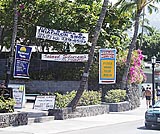By Glenn Scott
Advertiser Staff Writer
Kailua Village, the Kona Coast’s quaint commercial center, has been known over the years for its royal history, busy all-purpose pier and image as a relaxed retreat.
 |
| Signs advertising businesses in Kailua Village abound. Sherry Bracken, chairwoman of the nonprofit group Kona Outside Circle, has led the campaign against the signs, which she says make the area look "tacky."
Ken Love • Special to The Honolulu Advertiser |
Lately, though, as manicured Kohala Coast resorts have lured high-spending tourists north, business and community leaders in Kona have started to pay more attention to what they’re seeing along the village streets and what they’re reading in travel magazines.
Their conclusion: As Kona struggled during several years of sluggish economic growth, the village gradually lost some of its appeal. It developed a chronic case of clutter.
How that may have hurt Kona commerce is hard to pinpoint, given the greater economic trends and popularity of the flashy new nearby resorts. But a few writers with publications like Conde Nast Traveler magazine did take occasional notice, offering less than enthusiastic observations. In some cases they even suggested tourists arriving at the airport should simply turn left toward Kohala and skip the village altogether.
Now, however, with Kona’s economy percolating and new officials running local government, leaders are aiming to shape up the village and restore its attractiveness. They say they want to renew confidence that the venerable village can thrive as a clean and charming place even as growth of more upscale resorts and luxury homes gradually changes the profile of West Hawai‘i.
"We just want to be Kailua Village, to bring what we can bring to the party," says organizer Sherry Bracken. "If we do that, I know people will come."
And as a construction boom catering to high-end consumers continues on the west side of the Big Island, the stakes are rising. Rich residents bring money, and so do tourists. More than a million visitors passed through Kona last year, about 1 percent more than in 1999, with well-heeled tourists from the West Coast and Japan arriving more often. The island’s hotel occupancy rate — most hotels are on the Kona/Kohala side — rose by 5.3 percent in 2000, and average daily room rates jumped 6.9 percent.
Competition on rise
All that would be great news if the village were still the only real gathering place to shop or eat. But competition from newer centers is clearly on the rise. Benefitting from high occupancy rates at nearby hotels, the upscale Kings Shops at Waikoloa Resort is building a second phase and planning a third. Another center is in the works a few miles away at Mauna Lani Resort.
Some in old Kona see a parallel to circumstances in Waikiki. Peter Young, Hawai‘i County’s new managing director for Kona, points to Waikiki’s progress in self-improvement projects as a model for what the village might achieve on a smaller scale.
 |
| Peter Young, Hawai‘i County’s managing director for Kona, says the area needs "cleaning up." |
If Waikiki is the busy hub of Hawai‘i tourism, though, people in the Kona area have generally nurtured an opposite image as a laid-back, sea-sprayed place of escape — as well as a spot where civic campaigns have been hard to sustain.
But Young, who took over in December as part of Mayor Harry Kim’s new administration, said he’s certain that most residents are ready to see improvements.
"Something’s going to happen," he says. "I don’t know what it’s going to be yet, but I know there is a lot of positive energy."
To help things happen, Young has been holding weekly meetings in the village, as well as in other communities, to focus on civic projects. In Kailua Village, an early goal has been to clear out the prime symbols of commercial clutter: the stand-up sandwich boards and banner signs that became part of the everyday cityscape as merchants eager to attract interest displayed them along sidewalks and streets.
Bracken, chairwoman of the non-profit beautification group Kona Outside Circle, has led the campaign against the signs, which she says send the wrong signal to tourists and customers. "People don’t necessarily come to spend money in an area that looks tacky," she says.
The public attention on clutter has yielded results. Young says most merchants have removed their boards and banners. What’s more, he says local groups are realizing they can make even more substantive changes.
"A lot of Kona is the same," he says, "but as people have observed, it certainly is starting to look older. Maybe it just needs a little sprucing up, cleaning up. And there has been some tackiness with the signs. . . . What I’ve told people is this is not just about signs. But signs are a symptom, so let’s address that."
The interest in shaping up Kona has led so far to one larger result. When Bracken and Ron Aronson, chairman of the Kona-Kohala Chamber of Commerce, proposed a voluntary Kona cleanup day for Saturday, the mayor quickly expanded the idea into an islandwide event. Titled Malama ‘üina , the cleanup will involve hundreds of volunteers from at least 20 community groups just on the Kona side, said Bracken.
Many projects planned
Bracken measures the day’s potential in plastic trash bags. When she asked Hawai‘i County officials to donate 500 bags, they gave her 8,000. Among the projects: freshening up the county’s free parking lot in the village, a location lately known for junked cars, weedy walkways and rubbish. Other projects include shaping up popular public sites such as Old Airport Park and La‘aloa Beach Park, near heavily used Magic Sands Beach.
Young, a former real estate appraiser, said he’d like to build an agenda of private and public improvements that, in the long run, would strengthen Kona’s tourist and commercial appeal. One eventual possibility, he said, is creation of a business improvement district.
Polishing the local appeal, he notes, gains importance as more cruise ships pay regular calls at the Kailua pier. The village expects to host 104 regular stops by American Classic Voyages’ ships this year and another 44 by foreign-flagged vessels. That’s twice the number from last year, and plans suggest many more will arrive in following years.
As for the assuredly nonhistoric sandwich boards and banners, some people consider them holdovers from Kona’s rough times.
"Business here through the latter part of the 1990s, for sure, was not good," said Gale Carpenter, co-owner with brother Flint of Big Island Jewelers Ltd. "Business owners were going to find any niche they could to increase business, and you couldn’t blame them. They had car payments, too, and kids to put through school."
Commercial property manager Rolf Vossen said the clutter multiplied as one business owner placed a sign along a street and then others responded with their own. Signs that began along touristy Ali‘i Drive eventually spread to the highway leading into the village.
"The end result," Vossen said, "was that more and more sandwich signs showed up on the right-of-way fronting the highway."
That first glimpse of the village, as more than one writer pointed out in national travel publications, appeared in uninspired contrast to the scene vacationers discovered as they pulled into the orderly, landscaped and more expensive resorts of Waikoloa, Mauna Lani or Mauna Kea. That prompted an oversimplified way to advise tourists where to go as they pulled out of the Kona airport: they could turn right to cluttered Kona or left to cool Kohala.
"I thought the travel writers were wrong, overall, but they actually did us a service to get us to focus on it," said Aronson, president of Kona Coast Realty. "We thought, hey, the village does need a cleanup."
The Kona district still offers the same warm and tropical atmosphere, he said. The place just needs the same attention that many other Island communities could use.
"The cleanup and the signage issues are part of the whole thing," he said. "We focused on Kailua Village, but I know it’s islandwide, and I think it’s statewide."
Kohala popularity grows
Merchants also are turning their attention to competition arising on the Kohala Coast. Expanding retail centers, such as the King’s Shops at Waikoloa Resort, have removed some of the incentive for Kohala-based tourists to make the 20- to 30-minute drive into the village.
"It doesn’t help us if they don’t come here," said Michael Miereanu, who has run Computerworks in the village for 20 years. Miereanu said he voluntarily removed his sandwich board even though it helped customers find his store.
"I try to go along with the mood of the town," he said. "I must admit a lot of those signs made the town look a little junky."
Pointing to quaint Carmel, Calif., Chamber President Marnie Herkes says retailers here will be glad when the village is clear of clutter. "When the right atmosphere is there," she says, "signs and even a lack of parking don’t seem to matter. People come anyway."
Adds Gale Carpenter: "Good news travels fast. Bad news travels faster."
Glenn Scott can be reached by phone at 525-8064 or by email at gscott@honoluluadvertiser.com.
[back to top] |


